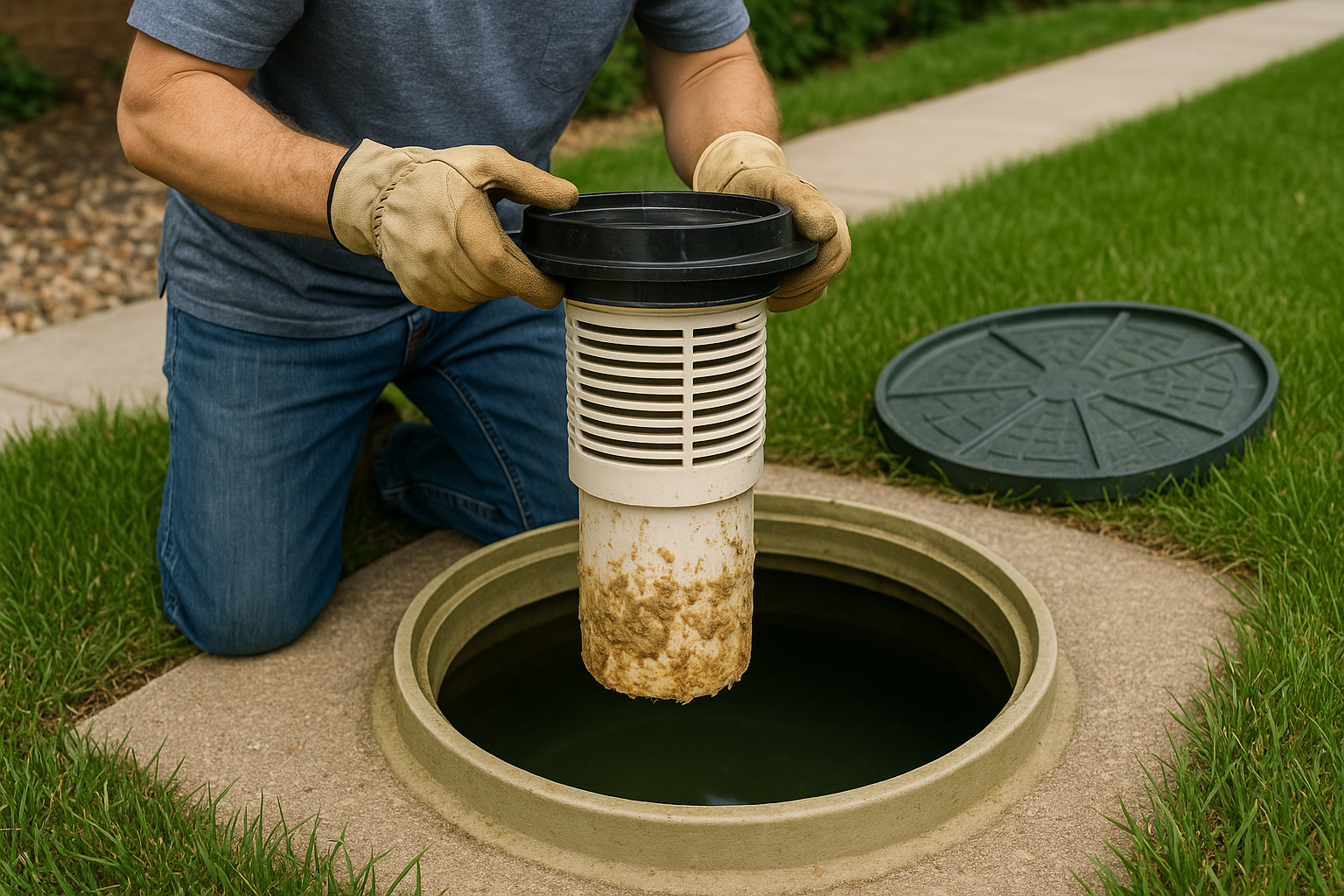Have you ever noticed unpleasant smells around your septic system or slow drainage in your sinks and showers? These are often early warnings of a clogged effluent filter or general filter blockage — indicators that your septic system isn’t functioning as efficiently as it should. The truth is, one small yet incredibly important component often determines the health and longevity of your entire septic system: the septic tank effluent filter. Although many homeowners tend to overlook it, this filter plays a vital role in maintaining septic tank protection, ensuring everything runs smoothly underground and saving you from expensive repairs in the future.
An effluent filter acts as your system’s final line of defense, ensuring that only liquid wastewater flows into your drain field while keeping solid waste securely trapped inside the tank. This essential process helps prevent clogs, minimizes backups, and extends the lifespan of your septic system by years.
By understanding how effluent filters work and why regular effluent filter maintenance is necessary, you can protect your home from avoidable septic disasters. Homeowners who follow a proper septic filter cleaning schedule and keep track of their effluent filter lifespan can maintain a balanced and efficient system for decades.
To explore how changing weather and environmental conditions impact your system’s performance, check out how climate change affects septic systems in California. The insights there highlight how crucial consistent maintenance is to keep your septic system resilient no matter the conditions.
The History and Importance of Effluent Filters in Septic Systems
While effluent filters may seem like a modern convenience, their concept dates back many decades. In the early days, septic systems had no filtration device, which meant solids and sludge could easily escape into the drain field. The result? Clogs, slow drainage, and expensive, premature system failures. Over time, as the understanding of wastewater filtration improved, the first effluent filters were developed — transforming septic maintenance forever.
Modern septic tank effluent filters now trap solids effectively before they reach the drain field, dramatically improving system reliability. In fact, today, many local regulations require them in new installations as a standard measure for septic tank protection. These filters safeguard your system from the inside out and are a simple, affordable way to prevent severe damage later on.
Advancbthey’re the backbone of a well-functioning septic system, helping ensure long-term reliability, protection, and peace of mind.
How Effluent Filters Work and Why They’re a Game Changer
At first glance, an effluent filter might look like a simple piece of plastic inside your septic tank — but its function is critical. It works by trapping solid waste particles while allowing liquid waste to pass through safely to your drain field. This filtration process, known as septic tank solids separation, prevents unwanted materials from clogging pipes and keeps your system working efficiently.
Here’s what makes it effective:
- Filter Housing – Encases and supports the filter while providing access for effluent filter maintenance.
- Filter Cartridge – Captures solids and sludge before they escape.
- Flow Path – Directs liquid wastewater smoothly, maintaining consistent effluent flow.
- Maintenance Access Point – Allows for easy cleaning, inspection, and septic filter replacement.
Together, these elements create a balanced wastewater management system that enhances septic tank odor control and prevents costly septic filter backflow.
Regular maintenance ensures your filter continues functioning at peak efficiency. Homeowners who take the time to clean their filters every few months often avoid the frustration of backups and repairs.
For a practical, step-by-step reference, check out our guide on septic tank cleaning and maintenance tips. You’ll find easy methods for cleaning and inspecting your system like a professional.
The Big Benefits of Having an Effluent Filter
If you’ve ever dealt with a backed-up drain or foul smell, you already know the importance of proper septic tank protection. Installing and maintaining an effluent filter offers long-lasting benefits that go far beyond convenience — it’s an investment in your home’s safety and efficiency.
Some of the key advantages include:
- Prevents costly clogs and backups
- Extends the septic filter lifespan
- Enhances septic tank protection and overall system reliability
- Supports environmental safety by filtering out contaminants
- Reduces long-term septic maintenance costs
Regular cleaning of your filter promotes healthy effluent flow, ensuring that bacteria and waste decomposition remain in balance. Homeowners who perform maintenance at least twice per year save significantly on repairs.
You can learn more about maintaining your septic system’s efficiency by reading our detailed article on septic tank longevity and maintenance tips. It shares expert guidance for extending your system’s lifespan while minimizing expenses.
Simply put, the effluent filter is one of the most cost-effective upgrades you can install. It not only safeguards your drain field but also helps your system perform better for years, offering financial and environmental benefits alike.
Common Challenges and How to Overcome Them
Even the most advanced septic tank filters need consistent attention. Over time, trapped solids can accumulate, leading to filter blockage, slow drainage, or even unpleasant odors. Fortunately, nearly all of these issues are preventable with proper effluent filter cleaning and regular inspection.
To avoid common problems, follow these steps:
- Schedule routine septic filter cleanings every 3–6 months
- Hire professionals for septic filter installation or system upgrades
- Stay alert for signs of blockage, such as bubbling toilets or slow drains
- Replace worn-out filters using certified replacement cartridges
Ignoring these signs can lead to backups or damage to your drain field — one of the most expensive components to repair. Regular effluent filter inspection ensures everything continues operating efficiently and keeps costly problems at bay.
If you’re considering upgrading your property’s system, you might also want to explore the option of switching from septic to city sewer in Sacramento. This article explains when such a switch makes sense and what homeowners should know before making the change.
With a proactive approach, even minor maintenance tasks today can save you from major septic headaches tomorrow.
How to Maintain Your Effluent Filter Like a Pro
Maintaining an effluent filter doesn’t have to be complicated. With just a little effort, you can keep your system running efficiently for years. Regular maintenance prevents clogging, enhances flow, and helps avoid the unpleasant smells that result from poor filtration.
Follow these steps for professional-level upkeep:
- Locate the access point to your septic filter housing.
- Carefully remove the filter to avoid breaking any parts.
- Rinse it thoroughly using a garden hose to remove debris.
- Inspect for cracks, buildup, or damage.
- Reinstall securely and make sure the lid is tightly closed.
These simple actions prevent future septic filter troubleshooting issues and keep your effluent flow consistent. Depending on your household size and water use, clean your filter every three to six months.
If you’re unsure or prefer expert help, hire a certified septic filter installation and maintenance service. Professionals can perform inspections, ensure proper filter sizing, and extend the lifespan of your system.
Consistent maintenance saves you both time and money while keeping your septic system performing at its best.
The Future of Effluent Filters and Septic System Innovation
As technology continues to evolve, effluent filter systems are becoming smarter, cleaner, and more sustainable. Modern designs incorporate eco-friendly materials, self-cleaning mechanisms, and advanced effluent filter sizing options to suit a wide range of systems.
Manufacturers are now creating filters that send alerts when it’s time for cleaning or replacement, taking the guesswork out of maintenance. Many modern filters also feature modular designs, allowing for easier upgrades and compatibility with existing tanks.
These innovations help reduce environmental impact by improving wastewater filtration and minimizing contamination risks. Enhanced septic filter housing structures also simplify inspections and promote longer-lasting, more efficient systems.
Homeowners who stay informed about these technological upgrades ensure that their systems remain compliant, reliable, and eco-conscious. The future of septic systems is one where filters are not only functional but intelligent — helping you manage your property with precision and confidence.
For a deeper understanding of how environmental trends influence septic technology, read how climate change impacts septic systems in California. It’s a must-read for anyone who wants to stay ahead of the curve in sustainable wastewater management.
Final Thoughts
Effluent filters may be small, but their impact on your septic system’s health and performance is enormous. By preventing solids from escaping into your drain field, they protect your home from costly repairs and environmental hazards. Regular effluent filter maintenance, timely cleaning, and consistent replacement schedules are the keys to avoiding issues and extending your system’s life.
When you understand how effluent filters work and invest in quality parts, you’re setting your septic system up for decades of trouble-free operation. Whether you’re maintaining an older tank or installing a brand-new one, always make the filter a top priority.
If you’re ready to take your maintenance to the next level, visit our resource hub on septic tank cleaning and maintenance tips for expert guidance.
With proper care, a well-maintained effluent filter protects your property’s value, keeps your environment safe, and provides lasting peace of mind — proving that sometimes, the smallest parts make the biggest difference.






